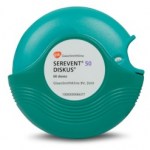- Type of Drug: Bronchodilator.
- Prescribed for: Prevention of asthma symptoms and bronchial spasms. Salmeterol does not provide immediate symptom relief.
Salmeterol (Serevent) General Information
Salmeterol differs from other bronchodilators in that it does not provide immediate symptom relief. It is used for longer-term symptom prevention; When you first start Salmeterol treatment, you may need to continue your other asthma inhalers for symptom relief. However, after a while, you should need the latter drugs less. Salmeterol works like other bronchodilator drugs, such as Albuterol, Terbutaline, and Metaproterenol, but it has a weaker effect on nerve receptors in the heart and blood vessels; for this reason, it is somewhat safer for people with heart conditions. Still, very large doses of Salmeterol can lead to abnormal heart rhythms.
Salmeterol begins working within 20 minutes and continues for 12 hours. Other drugs in this group do not work this long.
Salmeterol (Serevent) Cautions and Warnings
Salmeterol should be used with caution by people with a history of angina, heart disease, high blood pressure, stroke or seizure, thyroid disease, prostate disease, or glaucoma.
Used in excess, Salmeterol can actually lead to more difficulty in breathing, instead of relief. In the most extreme cases, people have had heart attacks after using excessive amounts of inhalant bronchodilators.
Long-term use of Salmeterol (and similar medicines) can lead to increases in certain ovarian tumors.
Possible Side Effects
Salmeterol’s side effects are similar to those of other bronchodilators, except that its effects on that heart and blood vessels are not as pronounced.
- Most common: heart palpitations, rapid heartbeat, tremors, dizziness and fainting, shakiness, nervousness, tension, headache, diarrhea, heartburn or upset stomach, dry/sore/irritated throat, respiratory infections, and nasal or sinus conditions.
- Less common: nausea and vomiting, joint or back pain, muscle cramps, muscle soreness, aches or pains, giddiness, viral stomach infections, itching, dental pain, feeling ill, rash, and menstrual irregularity.
Salmeterol (Serevent) Drug Interactions
- Monoamine oxidase (MAO) inhibitor drugs, tricyclic antidepressants, thyroid drugs, other bronchodilator drugs, and some antihistamines may increase the effects of Salmeterol.
- The chances of cardiotoxicity may be increased in people taking Salmeterol and Theophylline.
- Salmeterol may antagonize (disrupt) the effects of blood-pressure-lowering drugs, especially Reserpine, Methyldopa, and Guanethidine.
Food Interactions
Do not inhale Salmeterol if you have food or anything else in your mouth.
Usual Dose
Adult and Adolescent (age 12 and over): 2 puffs every 12 hours (each puff delivers 42 micrograms of Salmeterol).
Child (under age 12): not recommended.
Salmeterol (Serevent) Overdosage
Overdose of Salmeterol inhalation usually results in exaggerated side effects, including heart pains and high blood pressure, although blood pressure may drop to a low level after a short period of elevation. People who inhale too much Salmeterol should see a doctor. ALWAYS bring the medicine bottle with you.
Special Information
Be sure to follow the inhalation instructions that come with the product. Salmeterol should be inhaled during the second half of your Inhalation, since this will allow it to reach deeper into your lungs. Wait at least 1 minute between puffs.
Call your doctor immediately if you develop chest pains, palpitations, rapid heartbeat, muscle tremors, dizziness, headache, facial flushing, or urinary difficulty, or if you continue to experience difficulty in breathing after using the medicine.
If you forget a dose of Salmeterol, take it as soon as you remember. If it is almost time for your next dose, skip the forgotten one, and go back to your regular schedule. Do not take a double dose.
Salmeterol (Serevent) Special Populations
Pregnancy/Breast-feeding
When used during labor and delivery, Salmeterol may slow or delay natural labor. It can cause rapid heartbeat and high blood sugar in the mother and rapid heartbeat and low blood sugar in the fetus.
It is not known whether Salmeterol causes birth defects in humans, but it has caused defects in pregnant animals. When the drug is deemed essential, the potential risk of taking Salmeterol must be carefully weighed against any benefit it might produce.
Salmeterol may pass into breast milk. Nursing mothers who must take Salmeterol should be monitored closely by their doctor, and must observe for any possible drug effect on their infants.
Seniors
Older adults should use the same dose of Salmeterol as younger adults. Closely follow your doctor’s directions, and report any side effects at once.

